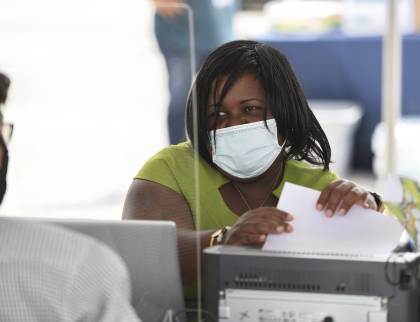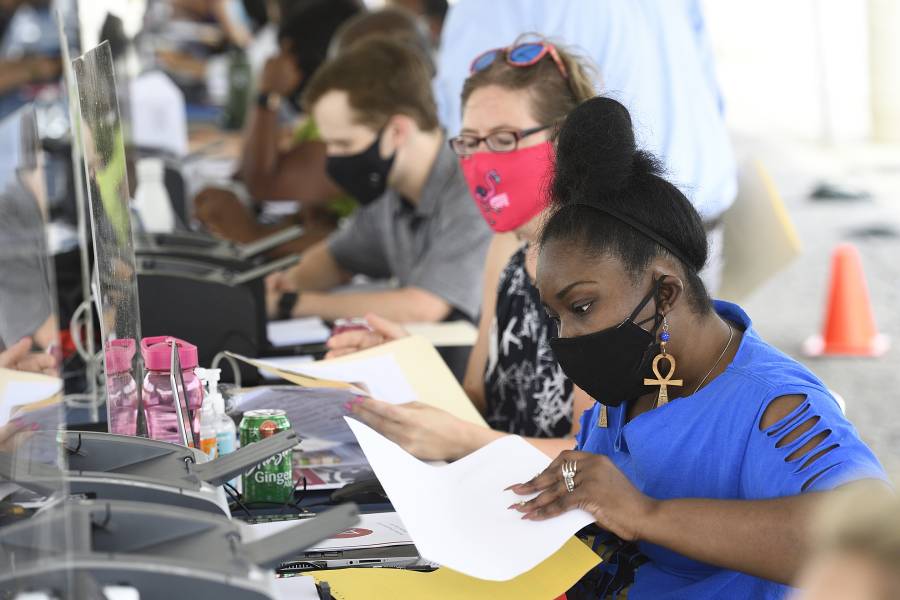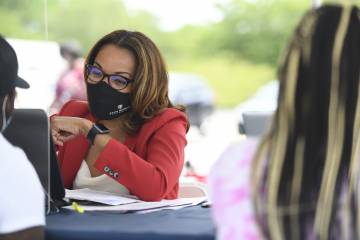It's a threat made to kids when they misbehave in school: This will go on your permanent record.
For many adults, though, it's not merely a threat. A criminal charge or other offense on their record can be a huge obstacle to overcome. It can prevent them from getting a job, finding a place to live, receiving a loan, or going to school.
The answer is expungement, which wipes certain records from public inspection. In other words, the criminal charge that shows up on a background check when applying for a job would no longer be there. It's an important way to help members of the community help themselves, and John Hopkins wants to do its part.
The Johns Hopkins Office of Economic Development, in partnership with Maryland Legal Aid, is hosting its fourth Expungement Clinic on Saturday, March 26, from 10 a.m. to 4 p.m. The event is part of Fox 45's B'More Healthy Expo at the Baltimore Convention Center, which offers health and wellness screenings plus dozens of exhibitors.
Volunteer attorneys from JHU, Maryland Legal Aid, the University of Baltimore, the Alliance of Black Woman Attorneys, and Monumental City Bar Association will meet with individuals who want to clear their records. The attorneys give advice, help fill out forms, and file the paperwork. It's free; all fees are covered by Maryland Legal Aid.
Alicia Wilson, Johns Hopkins vice president for economic development, had put on clinics like these elsewhere and saw the benefits firsthand. That led her to create the clinics at Hopkins. But Wilson is also an attorney, and she is one of the volunteers at the events.

Image caption: Alicia Wilson, Johns Hopkins vice president for economic development and an attorney, assists a community member at a previous Expungement Clinic held in May, 2021.
Image credit: Will Kirk / Johns Hopkins University
Wilson remembers helping a woman at September's clinic who showed up at 7 a.m. even though the event started at 10. She was eager to get her record cleared, and Wilson was able to help.
"You could feel the weight falling off her shoulders in that moment," Wilson said. "These are people trying to get their lives back on track. We're able to provide one small service that will change people's lives forever. It not only will give them a better chance at a job or going back to school, but it also gives them peace of mind."
At the first three clinics, legal experts helped 299 individuals clear 1,103 charges from their records, saving them $12,060 in legal fees. Studies show an 11% increase in likelihood of employment and a 22% increase in wages within the first year of a cleared record, and a $6,190 increase in yearly income.
The first clinic was small, held in the Turner Concourse on the university's East Baltimore campus. The third one added a resource fair, including HopkinsLocal HIRE, which can assist with resumes and give advice for job seekers. (HopkinsLocal works to increase economic opportunity in Baltimore City through construction, hiring, and purchasing activities.) This weekend's event, which still includes the resource fair, is expected to draw a much larger crowd.
"It's a diverse group of clients," Wilson said. One man was inspired by his daughter's success in her career and wanted to become a teacher. He couldn't because, as he put it, he did something stupid when he was young. Another was tired of only applying for what he called dead-end jobs that didn't do background checks. Others may have faced charges for things that were illegal but no longer are, as Maryland laws are always changing.
Wilson praised the partnership with Maryland Legal Aid, which handles the event setup and logistics, in addition to covering fees and providing pro bono attorneys. Since 1911, Maryland Legal Aid has provided legal services to low-income and marginalized individuals and communities, empowering them to overcome challenges and to achieve stability, independence, and an overall better life.
"Let us be a resource," said Angus Derbyshire, assistant director of training and pro bono with Maryland Legal Aid. "We want to help. It may take only 45 minutes to an hour to go through the process, and the result could make a substantial impact. If we can't help clear the record, we can still point you in the right direction for what to do next."
No appointments are necessary. Attendees should bring information about their charges, and can bring a phone (for scanning QR codes) or a resume to take advantage of other resources.
For more information on the Spring Expungement Clinic or if you have any questions, email JHConnects@jhu.edu, and follow @JHConnects across social platforms.
Posted in Community
Tagged community, hopkinslocal, economic development, alicia wilson









